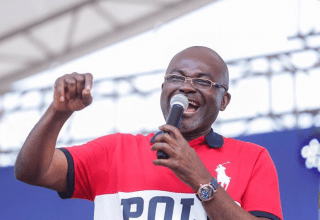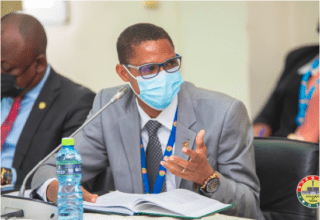
The Biden-Trump scenario seems to evoke the sentiments of the 2000 presidential election in the United States, with the world watching with bated breath to see how the country pulls through this one.
For almost two centuries, the world has looked at the US as a model of good governance, respect for the rule of law and a thriving democracy. No wonder, when the US went to the polls on November 3, 2020, the world sat glued to TV sets and watched proceedings each step of the way.
Hard-fought elections
It was one of the most tumultuous elections in the history of the US, following what many had described as an unprecedented and contentious election that came with everything, including disinformation and misinformation to win the hearts and minds of the electorate. Each side of the political divide accused the other of promoting unfair election tactics.
Nevertheless, the end is justifying the means, with projections favouring a Biden victory.
President Trump, on the other hand, is becoming the first incumbent US President to lose the popular vote in his re-election bid in almost three decades, since George H.W. Bush in 1992.
Quintessential campaigns
But despite the uncertainty surrounding the US election and the threat by President Trump not to concede, the streets of America are not boiling with violent demonstrations. Life seems to have quickly returned to normal. You hardly see party colours, emblems and signage of political parties on the streets.
On the contrary, in Ghana, when results don’t go the way of a particular political party, the party calls on its followers to occupy the offices of the Electoral Commission (EC) or go on demonstrations. There was something similar in the State of Arizona, but it wasn’t as widespread as we normally see in Ghana when a party contests the results of an election.
The lesson therein is that elections should not be do-or-die or make-or-break affairs. We can have quintessential campaigns to choose our leaders and that is the beauty of democracy. Beyond that, it cannot be a street war.
Democracy not static
For us in Ghana, the 2020 US Election, its inherent challenges notwithstanding, offers many useful lessons and reminds us here that democracy is not static but very dynamic, with each election a starting point and never an end in itself.
It was heartening to see many millions of Americans determined to exercise their constitutional right to cast their ballots. The record-breaking turnout, estimated to be the highest since 1900, when 73.7 per cent of the electorate cast their ballots, reaffirm a dearly held fact — that voting is a right Americans are no longer taking for granted.
It is good to know also that younger voters, age 18 to 29, made their voices heard in historic numbers, while mail-in voting
broke records in states around the nation, owing largely to health concerns over the COVID-19 pandemic.
Integrity of election
Maintaining the integrity of the election was also very important, which meant making sure every vote was counted. Indeed, the delay in the counting of mail-in ballots, as well as President Trump’s claim that counting the mail-in ballots was an effort to steal the election, predictably led to anxious moments, but that did not degenerate into national confusion and violence.
Even as results took a bit longer to come, there was the need to be patient and vigilant to ensure that each vote was counted.
For a moment, you could feel and observe that no person or media outlet was in a hurry to call the election. Indeed, projections were only made when all indications pointed to a Biden victory.
Transparency
Concerning transparency, Ghana is still sticking to the old script of in-person casting of ballots, instead of a mixed arrangement, including mail-in ballots.
Because of the fear of the spread of the COVID-19 pandemic, the US heavily relied on voting in absentia and an efficient postal system that it felt would move smoothly and yield results, just like queues at polling centres.
For the upcoming polls in Ghana, enhanced efforts must be made to ensure transparency at all levels of voting, including making known all deleted names from the register, activities in the so-called control room or collation centre, etc in order not to face any possibility of the rejection of the results.
COVID-19 pandemic
Ghana will hold this year’s polls in an atmosphere of COVID-19. The process may, therefore, be much slower, as we strictly enforce and adhere to the COVID-19 health and safety protocols of washing hands regularly, using sanitiser, keeping social distance, not shaking hands or hugging, among others.
This responsibility should not be shouldered by only the election managers or security agencies; it will need the cooperation of all political actors, parties, voters and even the citizenry to make the voting centres safe and secure for voting to take place.
Making democracy work
As we exercise our fundamental right to vote in this year’s elections, we must also be mindful of malicious actors who will seek to disrupt and interfere in the election process. The media in particular must avoid hostile efforts to create needless doubt around the democratic process.
It is important for all of us to support and allow our systems and institutions to work, instead of harbouring doubt. The EC and the security agencies have done it for the past three decades and there is no reason they cannot do it again, this time around, with the support and cooperation of the citizenry.
From the US election, we may have learnt that the system may need some reforms. Indeed, many political scholars have wondered why Americans persist with such a dysfunctional system of presidential election. For instance, why do they still have the Electoral College? These and many more have caused many scholars to think that some politicians could undermine confidence in the electoral process.
But in all of this, American democracy survives and works for everyone.
We in Ghana must also believe in Ghanaian democracy and help make it work for everyone.
Source: graphic.com.gh

















